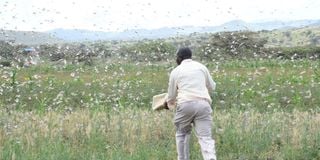Premium
Second wave of locust invasion causes panic in 11 counties

Anthony Majau, a wheat farmer, tries to scare away a swarm of desert locusts from his three-acre-farm in Nkando, Timau in Meru County on January 24, 2021.
Kenyans in 11 counties are staring at hunger following a second wave of invasion by gigantic swarms of desert locusts from neighbouring Ethiopia and Somalia that continue to devour crops and vegetation.
The ravenous insects have invaded Wajir, Mandera, Isiolo, Marsabit, Garissa, Samburu, Laikipia, Meru, Tharaka- Nithi and Turkana counties and have ravaged farms and grasslands, threatening food security for people and livestock.
Farmers in the counties have lamented over continued devastation of crops by the pests and asked the government to hasten dealing with the infestations as some of the swarms have already started maturing.
Some have been reported near Taita-Taveta and hopper bands spotted along the Coast.
Herders in northern Kenya counties fear the locusts could completely devour pasture and ignite resource-based conflicts.
Massive crops destruction
Farmers in Meru and Tharaka-Nithi have suffered massive destruction of their crops and are worried they could lose everything if the voracious pests are not quickly decimated.
Early this week, Meru County reported three swarms in Tigania East, Tigania West and Buuri which are threatening the county’s main source of livelihood — farming.
When the swarms invaded farms in Kwa Mungania and Nkando areas in Maili Nane, Timau, residents were forced to use traditional methods, including making noise, to scare them away.
Ms Sabela Kaloki, 80, whose maize plantation was devoured by the locusts, asked the government to come to their rescue.
“We have not slept. We kept chasing them away from the farm but they were persistent. We need immediate help else we will have nothing to harvest,” said the distraught granny.
About two kilometres from her home is Mr Anthony Majau’s three-acre wheat plantation which has also been invaded by the locusts.
Farmer disappointed
Mr Majau, who expected to harvest at least 25 bags from the farm, is disappointed following the destruction caused by the locusts.
“I have been chasing them away since morning. I did not know they feed that fast. We are tired and need help because our crops have been massively damaged,” Mr Majau told the Nation at his farm.
“I cannot imagine that all the effort and Sh150,000 has gone into the drain,” he lamented.
His immediate neighbour, who has a six-acre wheat farm, is also distraught as the locusts roosted at the plantation on Saturday night.
Mr Harrison Ndereba and 60-year-old Hellen Muriungi from Tumburi in Kisima, whose onion farms and napier grass were devoured, asked the government to expedite aerial and ground control operations.
The farmers asked the government to provide them with chemicals for spraying the pests, expressing fears that they could lose their source of livelihood and expose their families to a lot of suffering.
“We have reported the presence of the swarms to authorities but they are yet to respond. If they continue delaying, we will buy our own chemicals and spray the locusts,” said an agitated Alfred Mutwiri.
Meru County Agriculture Executive Carol Mutiga said the three swarms have caused massive destruction to crops, threatening food security in the region.
Trained scouts
Speaking to the Nation, Ms Mutiga said over 60 trained scouts, chiefs and ward administrators are on the ground monitoring the situation and sending real-time coordinates to the regional command centre.
“Some of the swarms have already been sprayed and the trained scouts are monitoring the locusts’ movement. The pests have caused massive destruction causing suffering to farmers who have not yet recovered from the biting effects of Covid-19,” said Ms Mutiga.
The Food and Agriculture Organisation (Fao) said several immature swarms continue to arrive in the country and are spreading towards northern and central counties.
Fao warned that any rainfall in the coming weeks will cause the swarms to mature and lay eggs and give rise to hopper bands in the next two months.
Kenya and neighbouring countries have been asked to intensify control operations.
Agriculture PS Hamadi Boga recently said the government has put in place the necessary measures to deal with the second invasion and that over 216,000 litres of pesticides have been procured.
Aerial spraying
One helicopter is doing surveillance and aerial spraying, Prof Boga said, adding that plans are under way to procure more planes.
“The military has promised to provide two planes and enough personnel — among them 500 NYS youths, community scouts and county teams — to assist in the fight.
“We will continue assessing the situation and making the necessary adjustments to contain the invasion,” Prof Boga said in a recent interview with the Nation.





